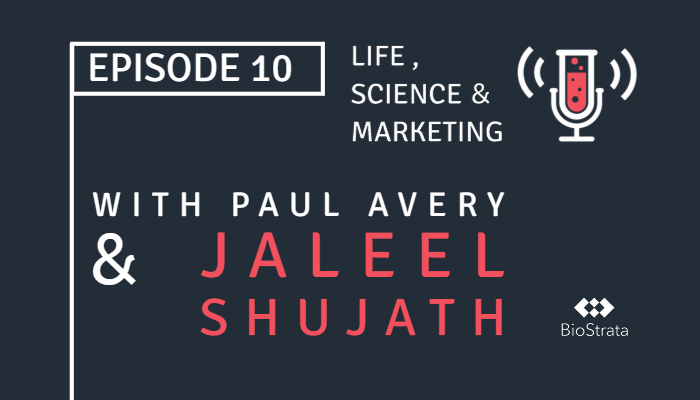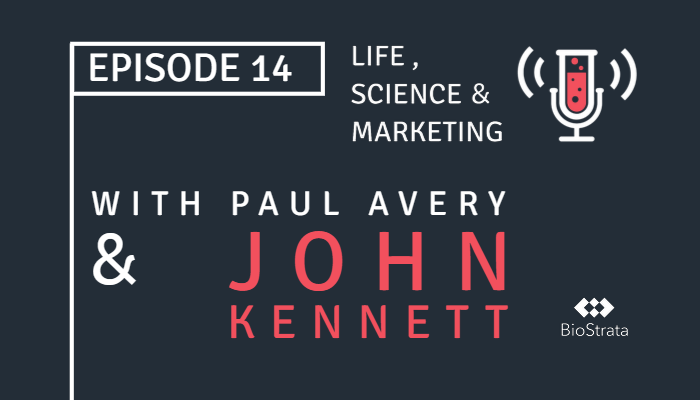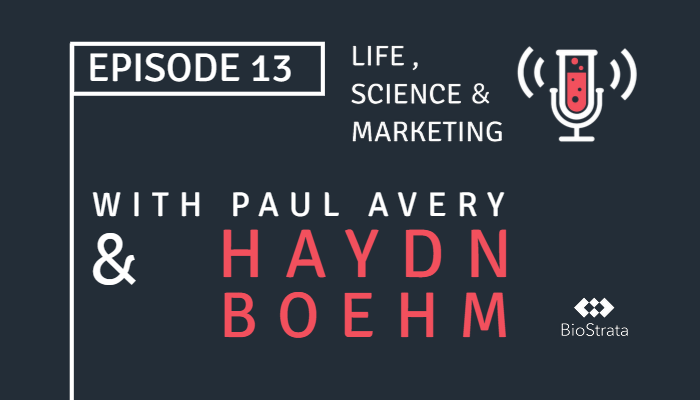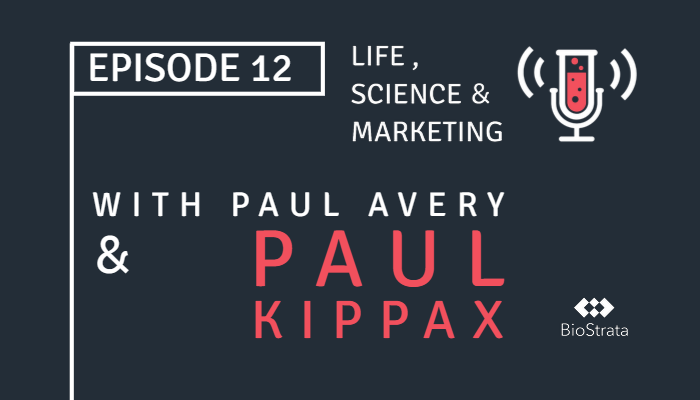Jaleel Shujath: Applying scientific rigour to marketing through continuous experimentation, data analysis, and learning
Our "Life, Science and Marketing" podcast features insightful discussions between host and BioStrata CEO Paul Avery and top marketing leaders across the life sciences industry. In each episode, guests share their backgrounds, experiences, and advice on marketing strategies and best practices.
In this episode, Paul spoke with Jaleel Shujath, an ex-scientist turned marketing expert who has worked with organisations like GE Healthcare, ATCC, and Absorption Systems over his 20+ year career. With a biology degree and lab experience himself, Jaleel discussed how he applies scientific principles to marketing for better experimentation, data collection, and optimisation. He offered valuable perspectives on embracing both successes and failures as learning opportunities, rigorously tracking campaign data, and tailoring approaches to each company’s unique needs.
Read on for a recap of Jaleel’s interview in episode 10 and his insights on using scientific rigor to enhance marketing efforts, defending marketing value through data, and continuously experimenting to drive incremental improvement. You can also listen to their full discussion in the podcast episode below or find us on your favourite podcast platform.
What made you passionate about science and fall in love with it?
Jaleel Shujath: I started working in a lab at Tufts Medical School to get more experience for medical school because my mother always wanted me to go. That's where my love of science began. Every morning we would see a note above the balance that said "Biomedical research is one of the most sustained joys a human being could ever endure" by famous essayist Louis Thomas. Reading that daily really made me realise that science is about discovery - discovering the world around us and new things about ourselves.
I was in that lab for 8 years, well past my graduation from Tufts. One of the things we get to see in science is discovery, whether it's discovering the world around us or discovering new things about ourselves. That's where I really fell in love with science and stayed so long into science. After the academic lab, I went on to Yale and Pfizer and got into pharmaceutical drug discovery where the palpable connection between what we were doing in the lab and human health was really evident. In fact, one of the drugs I worked on ended up becoming a marketed drug for renal cell carcinoma. It was a great pleasure to do that.
What is the drug you worked on that ended up getting marketed and how did that feel?
Jaleel Shujath: I was on the project team for Nexavar which is a renal cell carcinoma drug that Bayer marketed. I think they’ve come out with newer versions since then. When I went to their AACR booth this year, I saw the subsequent drugs and told them I worked on the original Nexavar drug. They were like “Oh my god, you’re one of the people that worked on this!” - it was really heartwarming and validating.
That drug demonstrated a direct impact on human health. In fact, the paper where we first described characteristics of Nexavar is still one of the most cited papers in modern cancer research. I'm very proud to have been involved with a drug that has that level of impact. My daughter who is 15 is also buoyed by the fact that her parents work in cancer research. She's currently doing cancer research at a university lab. So the passion we have for science is being pushed to the next generation as well.
What emerging technologies in life science have made you go "wow, that's cool"?
Jaleel Shujath: In the past two years I've seen the emergence of spatial transcriptomics, single cell RNA sequencing, single cell analysis, spatial analysis. Various combinations of those words have really come to the forefront of research technologies. I'm waiting to see what roles they play in actually developing drugs and drug discovery, but the information coming out is amazing.
I think the genomics revolution promised years ago is finally coming to fruition in a big way. All of those technologies I mentioned are directly related to the genomics revolution that is still going on. Genomics initially was about finding tangible differences between genomes of different species. But now it’s evident that the genome has variability even on a cellular level – cells at the leading edge of a wound express different genes than those behind it. The complexity is fascinating and will make things like CRISPR more useful.
What trends did you notice at conferences this year?
Jaleel Shujath: After the pandemic, people came back to conferences in a big way - almost every one I attended was oversubscribed with more attendees than expected. I saw a lot of hugs between people who hadn’t seen each other for a while. I don't think that level of attendance is sustainable long term – people were just anxious to network again after years away.
Digital marketing still has a role but the problem is differentiation when everyone's doing the same thing. To stand out, I heard about some companies going back to basics and sending targeted FedEx packages instead of digital blasts. When was the last time you got a package versus an email? The personal touch stands out. For the cost of a FedEx box vs. Google ads, you may be saving money with old fashioned approaches and know for sure your message was received.
What do you see as the biggest challenges of life science marketing?
Jaleel Shujath: Most people in marketing roles come from a science background but sometimes forget the “how” when it comes to experimentation and data. As scientists we had hypotheses, experimental design, methods, results, conclusions – the Cartesian method. Some marketers lose sight of that and make decisions based on intuition versus data.
My old boss told me to always have the data to back up my arguments because whoever has the best data wins. As marketers we have to track efforts, collect appropriate data, and apply the scientific method with marketing campaigns. Every company’s needs are different so while experience goes a long way, you can’t use a one size fits all approach. You have to be thoughtful and scientific about customising for each unique situation.
If you could give one piece of marketing advice, what would it be?
Jaleel Shujath: Get the data and make sure it's solid. When you present to upper management you have to be ready to defend your data and approach just like with presenting scientific results. Show the value they're getting for the money invested in marketing and why they need to continuously invest it. The data itself makes that case when aligned to business outcomes.
We don’t always showcase failures, but it’s important to note to leadership that we are trying new things and learning as we go. Not everything will be a smash success but by tracking data on wins and losses, we can optimise over time. The key is keeping that momentum year over year, not starting and stopping randomly.
If you could go back in time, what advice would you give your younger self?
Jaleel Shujath: I would say network, network, network. As an extrovert and former introvert, networking helps communicate with people and meet interesting colleagues. In this industry you'll see the same people again and again, so it’s good to build those relationships over time. I see a lot of shy people not really engaging others at conferences and I think that's a mistake – you have to get out there. That’s how I met Paul years ago and we reconnected for this podcast. Those connections pay dividends down the road.
Learn more with the Life, Science & Marketing Podcast
As we conclude this discussion with Jaleel Shujath, we'd like to thank him for sharing his wisdom and experiences. Jaleel welcomes further discussions - you can connect with him on LinkedIn or reach out to him via email at Jaleel@wespeakbio.com. He's always eager to engage with new people, answer questions, and share more insights from his journey bridging scientific and marketing expertise.
Remember to stay tuned for the next episode of "Life, Science and Marketing". We're excited to bring you more insightful discussions and actionable advice from leading experts in our field.
You can also follow the official Life, Science and Marketing LinkedIn page to keep up-to-date with the latest podcast news and episodes. Discover more marketing insights grounded in scientific principles, data-based decisions, and a spirit of curiosity.





